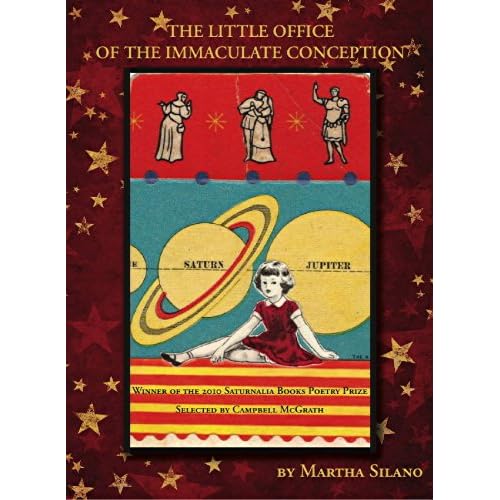
Karina Borowicz’s The Bees are Waiting has been selected by Franz Wright as winner of the 2011 Marick Press Prize. The book will be published this April. Until then, here’s a poem of hers recently published in
the journal Contrary.
Carving
He comes to understand
the spirit abiding in each scrap of wood
that passes through his hands
the spirit abiding in each scrap of wood
that passes through his hands
every child is born he
says
knowing the language of trees
for so long our unformed ear
is pressed to the wall of eternity
knowing the language of trees
for so long our unformed ear
is pressed to the wall of eternity
with his hands he
smoothes the wood
from which a face is beginning
to emerge
from which a face is beginning
to emerge
tools rest at his feet
the blackened little knife
a bent nail
the blackened little knife
a bent nail
Oriana Ivy has a new chapbook coming out from Finishing Line Press soon. It's called April Snow, and you can buy copies right now at the pre-release price. The book was the winner of the 2011 New Women's Voices Series. Oriana continues to write her blog of poetry and ideas. Her responses to questions of fate, epiphanies, destiny, love, heaven, and so much more are always engaging and inspiring. Check out the latest piece at her blog by clicking here.
Martha Silano's Little Office of the Immaculate Conception was blogged about her at Writing the Polish Diaspora recently. Click here.
Chris Wiewiora frequently posts his essays at The Good Men Project. I especially liked his piece “Grand (re) Opening” about trying to reunite with an old girlfriend. He also maintains his own website at www.chriswiewiora.com.
Martha Silano's Little Office of the Immaculate Conception was blogged about her at Writing the Polish Diaspora recently. Click here.
Chris Wiewiora frequently posts his essays at The Good Men Project. I especially liked his piece “Grand (re) Opening” about trying to reunite with an old girlfriend. He also maintains his own website at www.chriswiewiora.com.

Jack
Kulpa’s excellent True North: Reflections on Fishing and the Life Well Lived (Taylor Trade edition, 2005) was the first book-length
project to win the Ellis/Henderson Outdoor Writing Award from the Council for
Wisconsin Writers. Sports Afield ranked Jack's work as among
"the greatest outdoor writing of the twentieth century."
Translations of some of Grzegorz Wróblewski poems recently appeared in the Exquisite Corpse.
Aimee Pozorski, president of the
Philip Roth Society, continues her important scholarly work on Philip Roth with
a new volume coming out soon on Roth and Celebrity. She has also recently signed a contract with
EBSCO/Salem to do the Critical Insights volume on Roth.

Dr. Margaret Wacker recently had a
piece published on the death of her mother in Physicians Practice. Margaret
has also started her own blog called Stories of Living with Ghosts.
Evelyn Posamentier's book of wonderfully mysterious and evocative poems Poland at the Door is now available from Knives Forks and Spoons Press in the UK. Here's one of the poems:
This is where we switch trains
my room sails through the fog.
wait a minute. sea sickness
throws me from wall to wall.
yet pastures settle their greenishness
in the sailing room. the trains
become confused. what next?
Evelyn Posamentier's book of wonderfully mysterious and evocative poems Poland at the Door is now available from Knives Forks and Spoons Press in the UK. Here's one of the poems:
This is where we switch trains
my room sails through the fog.
wait a minute. sea sickness
throws me from wall to wall.
yet pastures settle their greenishness
in the sailing room. the trains
become confused. what next?
Bruce Lader, the husband
of Polish Poet Renata Lader, has a book coming out called Fugitive Hope. You can read more about it at his
website.
Bozena Zaremba
continues her excellent series of interviews with pianists for the Chopin Society
of America. Here’s the link to the most
recent, an interview with Russian pianist Ilya Yakushev.
Maria J. Pilatowicz's Walking on Ice, a novel about a young girl's life in Communist Poland, is now available from Tate Publishing.
Maria J. Pilatowicz's Walking on Ice, a novel about a young girl's life in Communist Poland, is now available from Tate Publishing.
John Guzlowski’s poem “Love
Song of T. S. Eliot” appears at Nonforgotten. His poem "38 Easy Steps to Carlyle's Everlasting Yeah" appears in City of the Big Shoulders, an anthology of poems about Chicago from University of Iowa Press. He also recently gave an interview about the uses of memory in his book Lightning and Ashes in the online journal As It Ought to Be. You can read the interview by clicking here. His anthology of poems about Heaven and Hell (37 poets, 48 poems) appeared online recently at Scream Online.
________________



